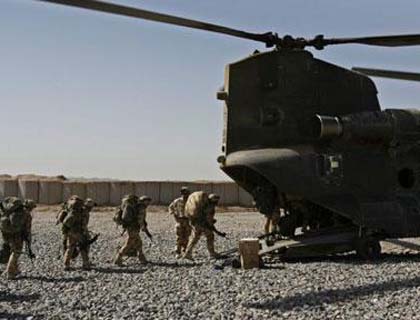In a remarkable gathering in western Herat province, tens of Jihadi leaders from south and western provinces and thousands of their supporters put the challenges ahead of Mujahideen on the anvil of hard talk and emphasized over developing close cooperation with Mojahedin Leaders across the country to combat security dilemmas likely resurface after 2014. The gathering was organized by People of
Afghanistan Jihadi Council on Saturday in the Shuhada (martyrdom) town of Herat Province.
It is branded one of the largest gatherings of Jihadi leaders in the western part of the country since 2001 when Taliban regime toppled by US-led military intervention. Noticing the important role that Jihadi leaders can play after foreign military withdrawal, some called the gathering of high importance for protecting the "Islamic and national values" which indeed has not found a clear-cut definition.
Ismael Khan, a highly influential Jihadi commander in the western provinces, and the current Water and Energy Minister, turned the sharp edge of criticism towards Afghan government and its foreign allies for
collecting of arms of Jihadi combatants, saying, "They disarmed us; instead armed French girls, Dutch girls, American girls, and brought white-skinned western soldiers, and black-skinned American soldiers.
By doing all this they failed to restore peace".
He also emphasized that Mojahideen could force out Soviet Union, so again there was need of them to get country rid of "foreign conspiracies". But it did not become clear what he meant by foreign
conspiracies. Did he mean the neighboring countries or others?
Anyhow, the main part of his rhetoric was the focused on the challenges after withdrawal of foreign security forces and the role of Jihadi commanders thereafter. He openly talked about reformation of
Mojahideen combatants, saying registration of people was underway. He claimed that President Karzai is also in the loop and he was a Mojahid himself. He said that next president should be elected in close
cooperation with Mojahideen councils. I did not listen his speech but local newspapers have reported that he said that next president should be a Jihadi leader.
Frequently, Jihadi leaders and commanders severely criticized the government and foreign allies over what some called systematic and pre-planned efforts to sideline them from the political mainstream.
Last month, in the death anniversary of former president and chief of High Peace Council, Burhanuddin Rabbani, Abdul Rab Rasoul Sayyaf criticized individuals who were, according to him, engaged in anti-Mojahideen propaganda. He said whatever people know as value and pride for the country belong to Mujahideen. "If we put away the achievements of Mujahideen, there would remain nothing to be proud of. The greatest medal that would be awarded by government to individuals with grand achievements in the international level is the medal of Wazir Mohammad Akbar Khan who was a Mojahid", he added.
Indeed, it has been a long time that Jihadi leaders moan about undesirable and misbehavior of government and other organizations towards Jihadi leaders. They complained that government along with international community has been trying to sideline them. While on the other, government has been under pressure by Human rights organizations and activists for appointing former Jihadi leaders on key positions.
They are arguing that tens of thousands of people have been killed and mutilated as result of "war for power" of Jihadi commanders and leaders after retreat of Soviet Union. Frequently, Human rights commission blamed Jihadi leaders who own mouthwatering positions in the administrative and political structure for the death of thousands of people killed during years of civil war.
No doubt, the words Mojahid and Jihad are inextricably linked with the religion. On the bases of jurisprudence of all Muslim sects, Jihad is one of the main pillars of Islamic ritual. If someone avoids carrying out Jihad, or simply holy war, he would commit great sin and would be punished by Allah Almighty in the hereafter. Of course Mojahid is also the person who carries out Jihad. If he is killed while engaged Jihad, he will be become martyred and if he remains alive also will achieve huge reward from Allah Almighty.
Afghanistan as the hotbed of clashes of different ideologies, the above two words have indeed found material form. Jihad changed into potential force that summoned hundreds of thousands of Afghans against Great Britain and Soviet Union. I think it was in these wars that Jihad and Mojahid developed into the most familiar words and took root within the culture and tradition of the country. Perhaps, these two words have been waved into destiny of Afghan people in manner that people like Abdurrab Rasoul Sayyaf has the right to say there is nothing to be proud of other then the achievements of Mojahideens.
It is hard, if not impossible, to flip pages of history and do not find Islam as the main religion of Afghans, and do not notice words of Jihad and Mojahid. Children from the very early age in school read: J for Jihad; Jihad is the obligation of all Muslims; M for Mojahid, Mojahid are those who fight in the way of Allah Almighty, and my grandfather went to Jihad.
Therefore, Mojahideens are highly revered and no doubt the can play critical role after foreign military withdrawal. Perhaps, no body may challenge such a constructive role in terms of restoration of peace
and security. But the question is: do the Jihadi leaders have a similar interpretation? Are they in consensus to wage war against Taliban and al-Qaeda that once were fighting at the same front against
Soviet Union? These are the questions that need to be dealt in a separate article.

